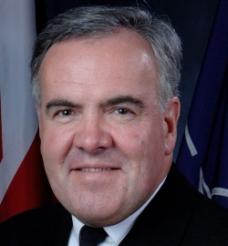Richard Leaman, chief executive, Guide Dogs
Merger is far from the only response to the recession, says Richard Leaman. Collaboration can be even more effective.
Like all charities, Guide Dogs has had to respond to the economic downturn to ensure we remain fit for purpose, and to reshape the organisation to deliver our far-reaching new strategy ‘Building Extraordinary Partnerships’. This strategy is based on what blind people have told us they need on their journey to independence and, as a result, over the next ten years Guide Dogs aims to deliver a broader range of mobility services to a much wider client base – so thousands more blind and partially-sighted people are enabled to get out and about on their own terms.
The bold decision – to expand both our client base, and the range of services we offer – was made amidst the greatest financial crisis of modern times. This in turn required us to think long and hard about how we were working and the changes we would need to make to ensure we could actually deliver.
In broad terms, we knew we needed to invest in brand awareness and fundraising, reduce our cost base, and reorganise ourselves for the biggest transformation Guide Dogs has seen for 80 years. As I write, in October 2012, compared with 2011 our costs are reducing, fundraising is up, and we have enabled thousands more blind and partially-sighted people to get out and about this year.
Fundamental to the delivery of our strategy – in terms of holistic service delivery, and cost-base reductions, is working in collaboration with others. I use the term ‘collaboration’ carefully, as it is sometimes misinterpreted to mean merger or acquisition. That is definitely not where Guide Dogs wants to go, for a variety of reasons – principally preserving our brand identity and associated fundraising, but also the reality that many of the financial advantages of merger are realisable through collaboration, without the massive management and cultural overheads which inevitably accompany a takeover.
Indeed, there does appear to be evidence that mergers in the charity sector are more likely to lead to a dip in brand awareness and fundraising for the smaller party, with no corresponding increase in awareness and revenue for the larger charity – so the whole is smaller than the sum of the parts, post-merger. Not to mention the opportunity costs in setting up such an enterprise in the first place.
And Guide Dogs recognises that there is strength in difference. We have one of the most recognisable and best-loved names in the UK charity sector. How we use and project this brand is vital to what we do and helps us to continue transforming the lives of blind and partially-sighted people. Sustaining this brand recognition is a significant factor in our decision to collaborate, and not merge, with other organisations. A merger rebrand could at best be a costly distraction in the short to medium term. At worst it could stop us from being able to fund our strategy altogether.
In contrast, Guide Dogs’ recent brand refresh has been very positively received by our stakeholders; our fundraising is up by 13 per cent on last year; unprompted awareness levels have almost doubled and prompted awareness levels continue to rise. So what is clear to us is that we must somehow protect our brand identity and independence, but at the same time, collaborate with willing partners, to accrue the financial benefits of integrated working, and where necessary, stretch our brand into new areas. One such area is our life-changing work with children and young people – not through dogs, but with highly-trained specialists who enable children to move about, play, learn, and travel independently using a white cane.
Partnership with National Blind Children Society
Though Guide Dogs has worked with children for over 20 years and currently delivers high-quality habilitation, orientation and mobility training to about 500 blind and partially-sighted children, we are not widely known for this work. We are committed to supporting as many children as we can to achieve their potential in the years ahead. To do so, we recognise the importance of partnering with other organisations that are recognised for their work with blind and partially-sighted children, their families and carers. One such organisation is the National Blind Children Society (NBCS). We have been working with the NBCS for some time so that we can better understand and provide for the needs of blind and partially-sighted children and their families. Specifically, we have been working jointly in Birmingham on a pilot programme called ‘Movement Matters’. This offers support and advice about mobility, orientation and independence to children and young people with visual difficulties, and to their families.
The two organisations share the same aims and values. Guide Dogs aims to support blind and partially-sighted people to get out and about on their own terms, with the same freedom of movement as everyone else. NBCS wants a world where children and young people with visual difficulties have equal opportunities to those of sighted children. Aligning our strategies while remaining independent is key to the success of the relationship. NBCS can benefit from Guide Dogs’ UK-wide presence and capability, while Guide Dogs can increase both market and fundraising awareness of our work with children through our association with the NBCS brand. And together we will deliver a more joined-up service to blind children and their families.









